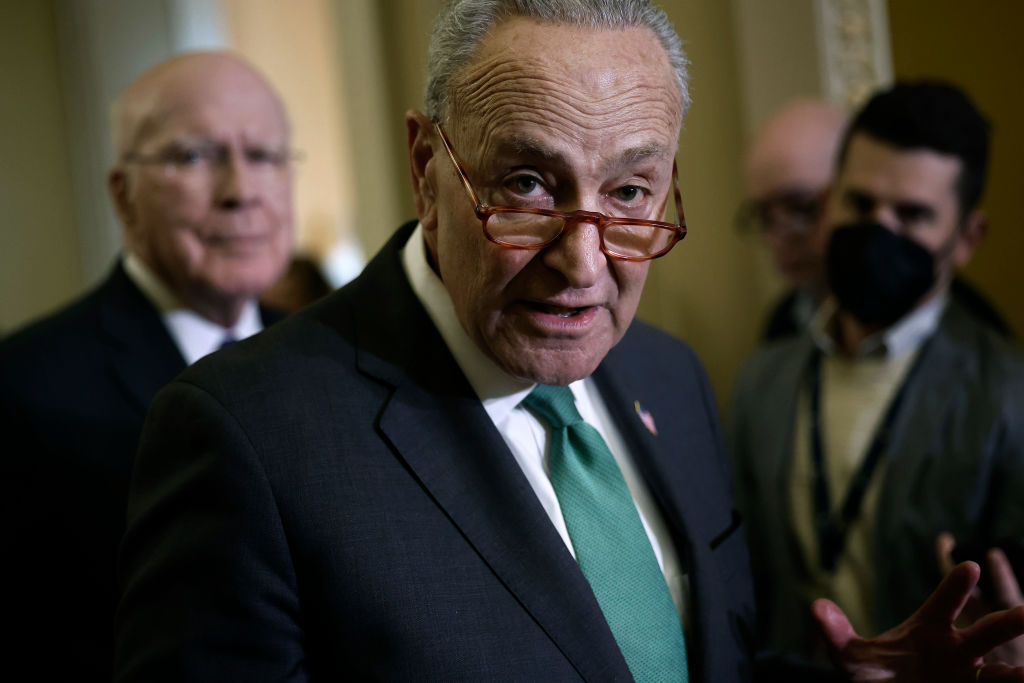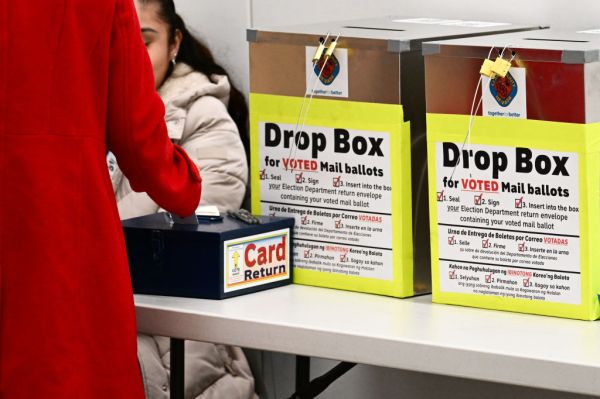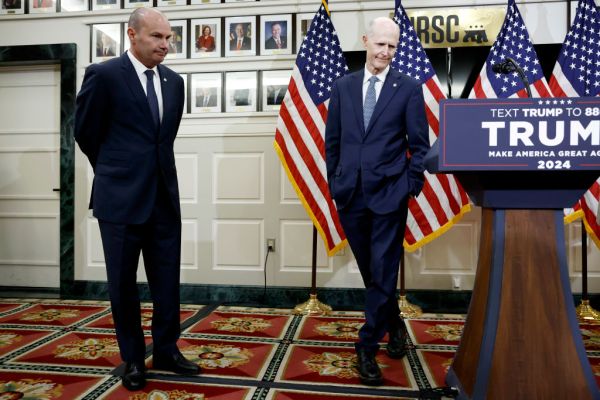By most measures, the bill Congress is considering to reform the Electoral Count Act (ECA) in the wake of 2021’s Capitol insurrection should have skated through a Senate vote by now on its way to becoming law.
The Electoral Count Reform and Presidential Transition Improvement Act is popular: The Senate version has 37 co-sponsors from both parties. It’s ready for a floor vote: The Senate Rules Committee voted 14-1 in October to advance the bill out of committee after the House passed it in September. It’s bipartisan: For several months it’s had the filibuster-beating support of more than 10 Senate Republicans, plus the White House and Senate leaders Mitch McConnell and Chuck Schumer. And the bill is salient: Many lawmakers believe that reform is necessary in the wake of former president Donald Trump’s actions to steal the 2020 presidential election. The bill, among other changes, clarifies that the vice president’s role in certifying results is a mere formality. (Find more of The Dispatch’s coverage of the bill here, here, and here.)
But instead of passing it before now, lawmakers waited to include the ECA reform in the $1.7 trillion omnibus spending bill it’s trying to pass before Christmas.
It may seem counterintuitive to those who grew up on Schoolhouse Rock or Mr. Smith Goes to Washington that popular bills languish in limbo for months only to make it to the Senate floor as part of massive must-pass packages.
Why is this so often the case?
Senate Rules 101
In contrast to the House of Representatives, the Senate is designed to prioritize the rights of individual senators, while the power of leadership, the will of the majority, and prompt action are secondary considerations. Hence the body allows for limitless deliberation and floor amendments to any bill under consideration.
A process known as “regular order” or the standing rules creates the opportunity for unpredictability (and sometimes chaos). Thus, bills typically don’t make it to the floor unless leadership is confident members will agree to a different set of rules to speed up the process. Known as “unanimous consent,” these agreements limit debate time and what questions—or amendments—will be considered along with it. Unanimous consent essentially waives senators’ individual rights in the interest of getting things done expeditiously.
Though the Senate was designed to pass bills shaped through debate, party leaders spend the majority of their time attempting to shepherd bills through while avoiding the gauntlet of unlimited public debate that regular order allows.
“It’s basically like, let’s figure this all out behind closed doors,” said James Wallner, a senior fellow at the R Street Institute and former congressional staffer. “And then once we do that, then we’ll put it on the floor. We’re not going to allow for any debate.”
But unanimous consent means that even one lawmaker can halt a bill, so individual senators wield a lot of influence. They also have the ability to place a “hold” on a bill, an informal—but respected—practice in which senators request their party’s floor leader to object on their behalf if they’re not there to do so themselves.
There are ways to get bills through the chamber even with regular order and the possibility of debate. But it’s not easy.
Had ECA reform passed as a standalone bill, here’s the process it would have gone through.
Introduction
If it’s clear that the bill can’t come to the floor by unanimous consent, the Senate could consider it via regular order. After being recognized, a senator (typically the majority leader) would make a motion to proceed to consideration of the legislation. That motion opens the door for a debate on whether the Senate should vote on the bill at all. The bill’s floor managers—usually the chair and ranking minority members of the committee that had jurisdiction over the bill—and sometimes other supporters, will make opening statements arguing for why the bill should pass.
Amendments
Typically, the Senate first considers amendments, if any, that the committee that advanced the bill has recommended, then other amendments can be proposed. Then comes a reading, debate, and an up or down vote (senators can also vote to table an amendment). Defeated amendments can’t be proposed again unless there are significant changes. Each amendment needs a simple majority to attach (though other complicated possibilities for amendments exist).
Filibusters
Under regular order or the standing rules, senators who oppose a bill can filibuster. Though the talking filibuster (in which a senator never yields the floor) is what many people think of as the primary way to do so, senators filibuster (block or delay a bill) in various ways: via limitless debate, offering amendments, or asking for roll call votes on amendments. Senators can ask for amendments on essentially anything—opening the door to wacky possibilities such as trying to attach totally unrelated legislation into the original bill.
Cloture
To break a filibuster and put a time cap on debate, lawmakers can, with a three-fifths majority (typically 60 votes), agree on a motion to invoke cloture. Even then, 30 hours—usually two days in session—must expire before the cloture vote can happen. And after that, there is still more time for debate, unless lawmakers agree to an immediate vote once the post-cloture 30 hours have passed. If the majority leader can’t get 60 senators to support invoking cloture, that bill is then considered “filibustered” and usually dies.
Votes and Passage
If a bill passes through that gauntlet and makes it to a final vote, it’s likely to pass. Votes can happen via roll call, voice vote, or, less frequently, division votes. Division votes happen if a lawmaker calls into question the outcome of a voice vote, in which case the presiding officer counts the senators voting for the measure and those voting against. A voice vote does not create a public breakdown of how each lawmaker voted. Roll call votes record the tally of the “yeas and nays” when a clerk calls on each senator. In most cases, if a simple majority—51 senators—vote for the bill, it clears the chamber.
A Question of Time
This all eats up a considerable amount of floor time.
“Every day devoted to one bill is a day denied for consideration of other legislation, and there are not enough days to act on all the bills that Senators and Senate committees wish to see enacted,” a 2019 nonpartisan Congressional Research Service report noted.
The Senate does have exceptions to its rules (and exceptions to its exceptions). In 2019 senators changed the post-cloture time for nominations to two hours. (Other tweaks mean nominations to executive branch positions and the judiciary require only a simple majority to reach cloture, essentially exempting them from the filibuster. The budget reconciliation process also has rules that allow a simple majority to circumvent a filibuster.)
“The problem of bringing up an individual bill is, among other things, procedurally, it can open itself to other amendments. And it just is a question of delay,” Thomas Kahn, a faculty fellow at the Center for Congressional and Presidential Studies at American University, said. “It’s just a question of efficiency.”
Such amendments would mean more debate and increase the chance of someone filibustering the bill.
So with high-stakes bills like ECA reform, it becomes easier to attach it to a must-pass eleventh-hour bill rather than doing the work of shepherding it through an arduous process. “Your question reminds me of my students,” Kahn said. “Some of my assignments are easy, and they can do it quickly. By some strange twist of fate, they always wait until the last week to do it.”









Please note that we at The Dispatch hold ourselves, our work, and our commenters to a higher standard than other places on the internet. We welcome comments that foster genuine debate or discussion—including comments critical of us or our work—but responses that include ad hominem attacks on fellow Dispatch members or are intended to stoke fear and anger may be moderated.